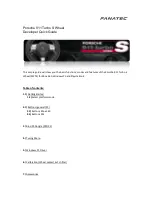
High Speed Operation
{
CAUTION:
Driving at high speeds, 100 mph (160 km/h) or
higher, puts an additional strain on tires.
Sustained high-speed driving causes excessive
heat build up and can cause sudden tire failure.
You could have a crash and you or others could
be killed. Some high-speed rated tires require
inflation pressure adjustment for high speed
operation. When speed limits and road
conditions are such that a vehicle can be driven
at high speeds, make sure the tires are rated for
high speed operation, in excellent condition,
and set to the correct cold tire inflation pressure
for the vehicle load.
If your vehicle has P255/55R18 104H size tires installed
on the rear axle, they will require inflation pressure
adjustment when driving your vehicle at speeds above
99 mph (160 km/h). Set the cold inflation pressure, for the
rear tires only, to the maximum inflation pressure shown
on the tire sidewall, or 36 psi (248 kPa), whichever is
lower. See the example following. When you end this
high-speed driving, return the tires to the cold tire inflation
pressure shown on the Tire and Loading Information
label. See Loading Your Vehicle on page 4-33.
Example:
You will find the maximum load and inflation pressure
molded on the tire’s sidewall, in small letters, near the rim
flange. It will read something like this: Maximum load
690 kg (1521 lbs) 300 kPa (44 psi) Max. Press.
For this example, you would set the inflation pressure
for high-speed driving at 36 psi (248 kPa).
The inflation pressure for the front tires should be set
to the cold tire inflation pressure shown on the Tire and
Loading Information label.
Racing or other competitive driving may affect the
warranty coverage of your vehicle. See your warranty
booklet for more information.
5-64
Summary of Contents for 2006 9-7X
Page 5: ...These are some examples of symbols that may be found on the vehicle v...
Page 6: ...NOTES vi...
Page 16: ...Put someone on it Get it up to speed Then stop the vehicle The rider does not stop 1 10...
Page 133: ...NOTES 3 3...
Page 134: ...Instrument Panel Overview 3 4...
Page 282: ...NOTES 4 52...
Page 296: ...When you open the hood on the 5 3L V8 engine here is what you will see 5 14...
Page 384: ...V8 Engine 5 102...
















































